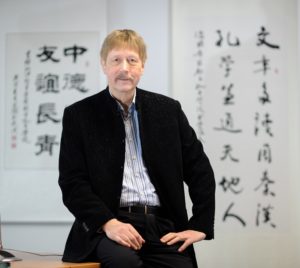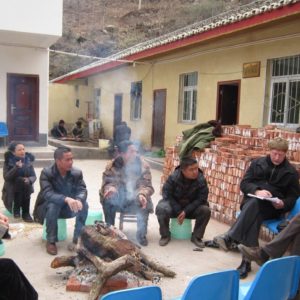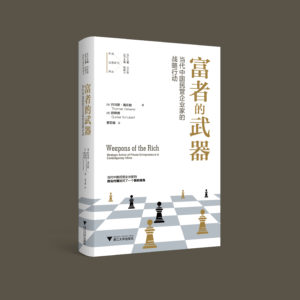Interview with Professor Thomas Heberer
By Bingshu Zhao, Sarah Khan, and Dario Castiglione
Thomas Heberer is a Senior Professor of Chinese Politics and Society at the Institute of East Asian Studies and Faculty of Social Science at the University of Duisburg-Essen in Germany. First visiting China in 1975 and working as an editor and translator at the Foreign Language Publishing House in Beijing from 1977 to 1981, Professor Thomas Heberer has been academically involved with China for over 50 years, and has conducted annual fieldwork in various regions in China since the early 1980s. In recent years, his focus lies on political, institutional, and social change; local governance; participation and elections; agents of change and strategic groups (entrepreneurs, farmers, ethnic minorities, etc.); political culture; nationality policy; social deviation and corruption; political and connective representation; social disciplining and civilising processes. His recent projects include Political Representative Claims (2016-2020); Local Governance in China (2009-2016); recent publications include Social Disciplining and Civilising Processes in China: The Politics of Morality and the Morality of Politics (2023) , Weapons of the Rich: Strategic Behaviour and Collective Action of Private Entrepreneurs in Contemporary China (co-authored, 2020).
Bingshu Zhao: Let’s start with your research interests. You are a professor of Chinese Politics and Society. How did you get interested in China in the first place? Was it through your academic studies or through other interests and experiences?
Thomas Heberer: The foundation for my interest was laid by my mother, who often bought geographical books for me as a child. I developed a special interest in the region of South and East Asia. As a teenager, I read many old reports about journeys in these regions. After graduating from high school in 1967, my father, a master baker, initially urged me to study law. But that didn’t really correspond to my interests. So, in 1969 I changed to ethnology as my major.
I hoped that would provide me with the knowledge to better analyse and understand other cultures and societies, as well as to acquire the relevant research methods.
At that time, the student movement was in full swing. At the university institutes, there were rising conflicts between professors and students regarding the role and contents of science and knowledge production. The students organised themselves into so-called “Basic Groups.” In the “Basic Group Ethnology”, we dealt with the reappraisal of the history of ethnology and its colonial past, with Marxist theories, with theories of imperialism and critical approaches to ethnological research. In this context, I also dealt with the work of the Marxist sinologist and social scientist Karl August Wittfogel (1896-1988) and his book “Economy and Society of China”. His detailed historical-materialist analysis fascinated me and I began to study China more intensively. Moreover, the “Cultural Revolution” (1966-76) taking place in China seemed to illustrate that there seemed to be an alternative to the encrusted Soviet model of socialism. I started to learn Chinese and went to China for the first time in 1975 as part of my doctoral dissertation project. There, the idea solidified in me that I should work in China for a longer period of time in order to better understand the country, its structures and the behaviour of its people. In 1977, shortly before completing my doctorate, I went to the Chinese Embassy in Bonn and applied for a job as an editor and translator at a Chinese publishing house, which I took up at the beginning of July 1977 and held until 1981.
Bingshu Zhao: In an article you have recently written, where you explain why you are a kind of “Ethnological spy in political science”, you say that you started as an anthropologist, but for academic reasons, you took your “Habilitation” in Political Science. However, you say that you are still attached to the ethnological methods and understand “politics as an institutional structure shaped and sustained by people”. This reminds me of an old Chinese saying, “The native water and soil nourish the native people” (一方水土养一方人), and the idea of which is often used to challenge the application of Western concepts and theories to the Chinese context because they are “not acclimatised to the water and soil” of China (水土不服). Can you tell us more about your ethnological methods in the study of Chinese politics, and whether you think they adapt to the “water and soil” of Chinese society?
Thomas Heberer: The core methodology of ethnological research is “fieldwork”. An American China scholar once wrote that field research in China is like fishing: You don’t know what fish you’re going to catch. His point was that the structures and processes in China are so complex and complicated that it often seems difficult to determine in advance whether you will actually get the information you are interested in. From there, one should keep research questions “open”, i.e., first check whether one will get the necessary information and modify the topic if necessary. It happened more than once that I did not get the information I had hoped for at the beginning of a field research. In some cases, this was because the topic I had conceived at home had a focus that ultimately did not fit local conditions.
Field research does not mean conducting a few interviews, but is linked to longer stays in the societies or places where one is doing research, including “participant observation,” i.e. participating in day-to-day activities.
Political scientists rarely conduct anything like “field research.” Therefore, the frequency of my field research activities is due to my ethnology studies.
Modern ethnology teaches that societies solve their basic tasks in different ways. Accordingly, we have to respect and understand these differing ways and not classify them as, for instance, backward. Our “modern” form of social order is neither “natural” nor the best. In addition, field researchers must always be aware of their role as outside observers and the subjective perceptions that go with it. As researchers, we come to learn and to understand other societies in the context of their social institutions and structures. Moreover, what we experience in other societies certainly contributes to reflection on our own society. People we interview should be understood as specialists in a particular social setting. They have a specific knowledge about things we are trying to understand. From there, the core principle for interviews is: Let people tell us what concerns them most. After the interviews, we then have to use our notes to decipher what they were trying to tell us and what not. Thus, we must use interview content to paint a coherent picture of human behavior and thought, in which we pay attention to the deeper meaning of interview statements. Moreover, an important task of the social scientist is to transfer the findings, experiences and results of his research linguistically and intellectually into his own society. In this respect, he is ideally also a cultural translator.
Regarding your question of whether Western concepts can be adapted to Chinese society I would like to quote Sociologist Peter Evans who has alerted us to be cautious of “institutional monocropping,” i.e. “the imposition of blueprints based on idealized versions of Anglo-American institutions” which neglect the distinct features and institutional-organizational particularities of specific countries such as China.
Sarah Khan: In your working paper for the Harvard Ash Centre, ‘Disciplining of a Society: Social Disciplining and Civilising Processes in Contemporary China’, you use the term “the developmental state” that you describe as “a purpose-oriented and strong state where the elites are dedicated to a specific mission: modernizing their nation.” Your sense of the word “modernizing” is material, but you show that the state aims to provide an ideological education, or re-education, of the individual citizens towards more collective economic objectives. I want to ask, with China as your empirical reference, whether, when you talk of “education”, you distinguish between the process of formation of the individual as a general social category, and the actual education of particular individuals? Relatedly, in your historical work, have you discerned, for example, the emergence of the individual in China as a legal subject, a bearer of rights, the responsible citizen, perhaps coincidentally with the advent of modernising influences?
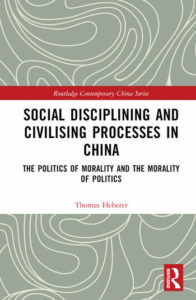
Thomas Heberer: As far as “modernization” is concerned, I have argued that there is no unilinear path to modernisation, but country-specific ones with commonalities but also marked differences resulting from history, political and material culture, institutional set-up and the specific resources available. Shmuel Eisenstadt called this “multiple modernities.” Since the late 19th century, the Chinese modernisation paradigm has been “adopting Western knowledge for its practical uses while keeping Chinese values as the core” (in Chinese: Zhong ti Xi yong). In short, one could also put it this way: Learn from the West, but remain Chinese. This goal is also represented by the idea of “socialism with Chinese characteristics.”
For thousands of years, Confucianism was the dominant worldview that shaped China and the Chinese at its core and is still a determining factor in what is called “culture” today. But what is “culture”? Anthropologist Clifford Geertz (1926-2006) has characterised culture as a net-like interweaving that facilitates interpretations and classifications. Humans, he says, is a being enmeshed in self-spun webs of meaning, and culture should be seen as this web. Indeed, the cultural environment influences perception, classification, behaviour and thinking. At the same time, culture must not be understood as a static, essentialist concept, but as a dynamic one. Cultures change permanently by absorbing the new, rejecting the outdated and adapting to processes of change.
The role of the individual is also not identical in all modernising or modern societies. It would be problematic to believe that modernisation would automatically lead to individualism in the Anglo-American sense. Let me give you an example:
In individualistic societies, the self is conceived of as an autonomous entity that exists independently of community relations and tends to give priority to the pursuit of personal goals. In collectivist societies, by contrast, social behaviours are more strongly regulated by norms, duties and traditional obligations. Self-interest is subordinate to the common good.
Chinese philosopher Lin Yutang (1895-1976) explained the notion of the individual as follows: “The Chinese are a nation of individualists. They are family-minded, not social-minded, and the family mind is only a form of magnified selfishness.”
The Chinese term for “individuum” (geti) literally means “single body.” It is understood to refer to a person as part of a collective, e.g. the family. The Chinese tradition conceived of the individual as an integrated element within a larger familial, social and political whole, and not as an autonomous agent of a self-determined life endowed with freedom of will. Individuals were embedded in a web of social relationships from which they could not escape, except by retreating into eremitism or inner contemplation.
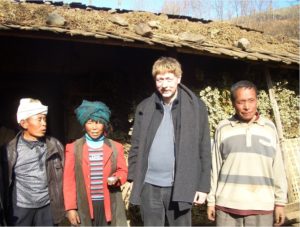
These contrasts with regard to the position of the self in society hampered Chinese intellectuals’ understanding of the European notion of the individual; however, while the marketisation of the world has arguably made China more individualistic, albeit on a lower level, to some extent the perceived differences between Western individualism and Eastern collectivism persist to this day.
Sarah Khan: In the same paper, you also speak of the Chinese state’s creation of “a new social morality” under Xi Jinping, as a disciplinary instrument for the citizenry. However, despite the moniker ‘new,’ you point out that often, the slogans asserting these values are “historical idioms including some from Confucian classics,” such as in the “civilising contract” you saw everywhere in the city of Anyang in Henan Province in 2019, which stipulated 36 predicates of morality. Do you think that the attempt to reconcile the values of Chinese canonical texts with those associated with Western modernity is a prominent practice of the Chinese state apparatus?
Thomas Heberer: This question ties in with question 3. Yes, Party leader Xi Jinping continually cites Confucian classics and Chinese history to comment on or explain domestic and international political developments and significant events. Tenets such as xiaokang (modest prosperity), datong (great community or great harmony) and the “harmonious society” (hexie shehui) are conceptualisations that did not originate with Xi but are deeply embedded in China’s Confucian and state-theoretical worldviews and at the same time are part and parcel of the modernisation narrative.
But Xi does not want to simply return to Confucian values, so in 2012 the new set of values was set out in the so-called “Socialist Core Values.”
These values encompass twelve (partly very abstract) points: wealth and strength; democracy; civilisation; harmony; freedom; equality; justice; governing by law; patriotism; devotion (to work); credibility and friendliness. They are propagated almost everywhere in public spaces, in the streetscape, in public buildings, educational institutions, offices, on banners and in short videos, and even on small cards placed on restaurant tables.
The 12 values embody a mixture of Chinese values (such as harmony, patriotism, devotion and credibility) and “Western” ones (democracy, freedom, civilisation) and what are understood as “Marxist” core values (freedom, equality, justice). However, terms such as democracy and freedom are defined and interpreted differently from “Western” concepts by the CPC. Democracy in this sense stands for “socialist democracy”, which – so the argument goes – already exists in the current political system (keyword: “people’s sovereignty”) but should be strengthened in future. Freedom, in turn, is primarily understood as freedom of the collective, of the community or of the state, not of the individual. This signifies that the “socialist core values” are first and foremost based on the party leadership’s interpretation of socialist-Marxist and Chinese “values”. At the same time, Xi emphasises that these core values are rooted in China’s “excellent traditional culture.”
Bingshu Zhao: Your recent book, “Weapons of the Rich. Strategic Action of Private Entrepreneurs in Contemporary China”, is about the role, identity and strategies of businessmen and entrepreneurs in China. In the history of modern China, we see a period in which the private sector and private entrepreneurs are the targets of the revolution, and a period by the end of the 1970s when their position and role are acknowledged as contributing to modernisation and developmental goals. Can you tell us something about this change, and furthermore, the strategies and place of this social group in relation to the other social and political groups and elites of Chinese society?
Thomas Heberer: Yes, the private sector and private entrepreneurs were targets of the Chinese revolution, specifically in the 1950s and during the Cultural Revolution.
A central factor of change since the 1980s has been the re-admission and promotion of the private sector. Unlike in the former countries of Eastern Europe and in the Soviet Union, with the beginning of economic reforms at the end of the 1970s, privatisation in China took place less “from above”, i.e. a complete transfer of existing state-owned enterprises to private owners by the state, but rather a so-called bottom-up privatisation in the form of an expansion of private ownership through the establishment of enterprises from within the population.
Today, the private sector is by far the largest economic property sector. During the Maoist period (1949-1976) it was largely brought to a standstill, which led to massive supply shortages because there were virtually no small handicraft businesses, restaurants and shops for everyday needs any more. When fundamental economic reforms were introduced at the end of 1978, only about 140,000 so-called household enterprises officially existed, even though the informal economy flourished in some poorer areas.
According to official figures, the private sector employs about 350 million people, contributes more than 50 per cent to tax income, more than 60 per cent to GDP, more than 75 per cent to innovation, 80 per cent to urban employment and 90 per cent to rural employment. With more than 95 percent of all enterprises, the private sector is now the dominant sector in the economy and indispensable for further development. Since the state sector still enjoys priority and numerous privileges (subsidies), private entrepreneurs try to assert their interests through informal means (such as lobbying, networking, through business associations, party membership, company party organisations, parliaments, etc.). The aforementioned book “Weapons of the Rich” attempts to trace these formal and informal efforts to exert influence.
Dario Castiglione: Thomas, you have actively studied Chinese society and politics for at least forty years. You have seen Chinese society from the “inside”, as you say, as an anthropologist. Moreover, your view of post-revolutionary China has generally been “sympathetic”, even though you have maintained a critical look of modern China both as an academic and as a political person with his own convictions. Looking at the self-image of China as a “communist” country, led by a “communist party”; and as a country which, since the end of the 1970s, has developed a formidable market economy, and embraced, at least from what one can see in the big cities, a culture of consumerism; what is “socialist” in contemporary China?
Thomas Heberer: If one assumes that I have “generally been sympathetic” to post-revolutionary China, then this is not least due to the fact that I was a witness to the enormous change from a planned economy of the Stalinist-Maoist type to an opening and reform of the system in the late 1970s and early 1980s. When I came to work in China in 1977, China was one of the poorest countries in the world. Almost all goods were rationed, there were great shortages of everything. I also witnessed rapid change after the dissolution of the large rural collectives, the people’s communes, the return to peasant household management, combined with the admission of peasant markets and the re-admission of the private sector and thus a rapid improvement in the supply situation. Only those who have experienced the China of that time and the subsequent rapid process of change can understand what this transformation has brought to the Chinese people and why they are proud of this achievement.
What is still socialist? So far, land has not been transferred to private ownership. In urban areas it is state property, in the countryside it is collective property at village level. Officially, land can neither be bought nor sold. Reducing income inequality is high on the CP’s to-do list.
I don’t think we should work with the categories of “socialist” or “communist” when it comes to China. It makes more sense to speak, as I have done, of a “developmental state” which – based on Chinese characteristics and following the models in East Asia – has not only eliminated absolute poverty, but is striving to develop the nation rapidly and in a planned way to become a “comprehensively modern country” and a world power on a par with the USA by 2049/50.
